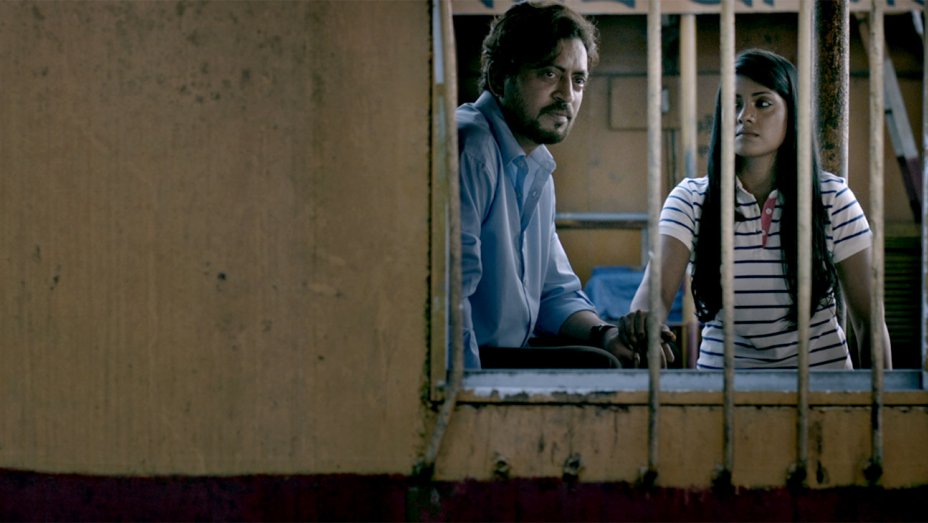Feature films from India and Bangladesh finding recognition and sometimes even awards at International Film Festivals does not necessarily mean that all these films are of international standard in terms of quality, form and content. But this recognition does help in garnering some audience interest when these films are released in the respective home countries. Doob (No Bed of Roses) directed and written by Mostafa Sarwar Farooki, one of the most renowned young directors of Bangladesh today, falls within this bracket.
Doob has finally released after quite some controversy in Bangladesh because some parties accused the director of directly borrowing from the real life story of an iconic writer in the country, Humayun Ahmed. It could not get a theatrical release for long reportedly till Irrfan Khan, who has done the main role of a filmmaker, stepped in as co-producer with Eskay Films of Kolkata representing the Indian side. Meanwhile, the film bagged the Kommersant Jury Prize at the Moscow International Film Festival, June this year besides having been chosen for screening at seven other international film festivals.
However, for all the accolades an awards it has won, the film’s narrative is sluggish, focusing on Javed Hassan (Irrfan Khan), a famous filmmaker of Bangladesh. The dramatic conflict is triggered by a news item flooding the media that reports how Nitu (Parno Mitra), a young star in his under-production film, has talked about her special relationship with the filmmaker. Nitu happens to be a childhood friend of Javed’s daughter, Saberi (Nusrat Imrose Tisha). This devastates the entire family– his first wife, Maya (Rokeya Prachy), daughter Saberi and son Ahir (Rahad Hossain) even as their new house – a palatial mansion is coming up. This reminds one of Tapan Sinha’s classic Jotugriha (1964) in which a couple’s marriage falls apart even while their house is being built. . The young Nitu is incurably besotted by this director she has known since she was small and despite his umpteen attempts to push her away, due to pressure from his disturbed and furious wife, he ultimately marries her and is cut off from his first family including the two children who refuse to communicate with him. The politics within the family comes to the surface when Javed dies suddenly and the second wife tries her best to keep the first family away from the last rites.
The plot and theme have many examples in real life except that the second wife is his daughter’s childhood friend and therefore, much younger than him. But the personal angle fails because it is kept at the surface level without attempting to probe deeply into the mindset of the four main characters – Hassan, Maya, Nitu and Saberi. The narrative, therefore, is rather weak and shallow and even Irrfan the actor appears more confused than certain about his character. There is absolutely no reference to Javed’s filmic backdrop except for the young man who arrives from Chittagong appealing to train him in filmmaking and who, Javed throws out for some ‘unethical’ practice the man has done. In fact, there is absolutely no ambience of Javed being a part of the Bangladeshi film industry and also a prominent figure with a long track record in cinema. Strange, that a filmmaker like Farooki ‘forgot’ these minor details that would have added depth and credibility to the film and also enriched the interaction between and among the characters and the narrative. Nitu is also not given a social history and there is an unconvincing attempt to make her out as the villain/vamp in this ‘once-happy-family’ story.
What really stands out in the film is the very underplayed and dignified performance of Rokeya Prachy as Maya, his first wife, who neither runs to the media with her sob story nor wallows in self-pity but tries to move on through teaching cinema perhaps because she was one a noted leading lady in films. Tischa as Saberi, the angry and pained daughter picks up the emotional notes only post-interval but her heavy make-up and several fashion-house costumes somehow undercut the emotional stress. Parno Mitra as Nitu is given a rather rough deal because her character is almost like a also-ran and except smoking away to her heart’s content and trying to woo Javed through the lunch box she sends taking care of his gastric problems, she has nothing to show. We see in the end that they also have a small son but there is no foregrounding of their love. An outstanding performance comes from the Indian producer Ashok Dhanuka who portrays a kind of Man Friday to the director in his studio apartment where he goes to live after separating from his first wife. Dhanuka does not have a single dialogue but says everything through his body language and facial expression. Irrfan speaks his dialogue in Bengali himself and does a reasonably good job of it considering that this is his first Bangla film.
The cinematography is mainly focused on long, slow panning shots, some tracking shots and lots of overhead and top angle shots that capture the vistas of Dhaka city, while adding some big close-ups of Javed and Saberi that do not quite catch their trauma. The editing is jarring and lacks the kind of rhythm or pacing the film demands. The music and songs and kept to a minimum, which was a wise decision.
The opening and closing shots draw the narrative in a circular fashion to end where everything began, with the distance between Saberi and Nitu evident from the way they sit at the school reunion but it does not add anything to the film in any way. The title – Doob (No Bed of Roses) could also be taken metaphorically to suggest to the young and ambitious director that making a film on a living personality even in the fiction genre is really ‘no bed of roses’.
Bengali, Drama, Color


